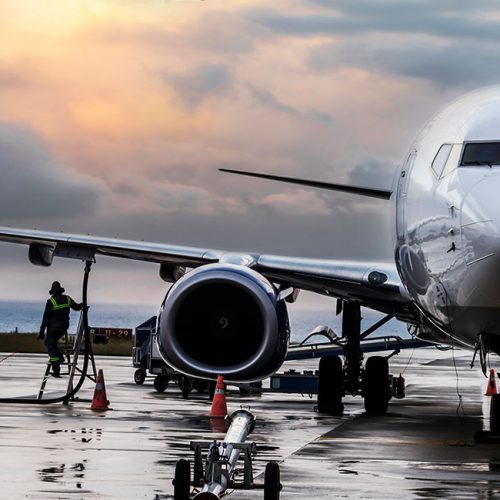
Rocky Mountain Institute Joins The Good Traveler Carbon-Reduction Program with Mission to Scale Impact
November 9, 2017, New York—The Good Traveler, a nonprofit collaboration among airports and transportation authorities, and Rocky Mountain Institute (RMI), a global nonprofit focused on transforming energy use, today announced a multiyear partnership focused on scaling the impact of The Good Traveler aviation carbon-reduction program. The Good Traveler empowers organizations, airports, individuals, and cities to reduce their environmental footprints through carbon offsetting.
RMI is contracting with San Diego International Airport (SAN) to administer the program, which was pioneered by SAN in 2015. In addition, RMI is helping to shape strategy as part of the Advisory Member Group, which currently includes SAN, Seattle-Tacoma International Airport, Austin-Bergstrom International Airport, the Port Authority of New York and New Jersey, and Dallas Fort Worth International Airport.
Over 63 million tons of voluntary carbon offsets were sold in 2016,[1] of which a significant portion are estimated to be purchases made to address travel specifically. The partnership’s objective is to grow the market for high-quality carbon reduction options, and to cultivate new travel-based emissions-reduction projects. The global aviation industry produces around 2 percent of carbon dioxide emissions. However, there are few options to accelerate efficiency and the International Air Transport Association expects passenger growth to nearly double from current levels by 2035.
The Good Traveler currently supports regional climate mitigation projects including the Arcata Community Forest in Northern California, the Big Smile Wind Farm at Dempsey Ridge, and Water Restoration Certificates® by the Bonneville Environmental Foundation. RMI plans to incorporate in-sector travel emissions-reduction projects over time, such as projects involving sustainable aviation fuels, which have the potential to reduce life-cycle emissions by as much as 80 percent.
“We’re thrilled to join these airport leaders advancing sustainable travel and we are committed to ensuring The Good Traveler drives carbon-reduction innovation,” said Adam Klauber, Director of Rocky Mountain Institute’s Sustainable Aviation program. “We look forward to expanding its customer base and to integrating in-sector offset projects. This will be a game-changer for decarbonizing the fast-growing aviation industry.”
“The Good Traveler program is an important part of San Diego International Airport’s efforts to address the impact of carbon emissions on climate change,” said Kim Becker, the airport’s President/CEO. “We are proud to see this program grow and expand to other airports across the country.”
“Visitors and citizens of the Seattle region care deeply about the environment,” said Port of Seattle Commissioner Stephanie Bowman. “And we’re responding with our own commitment to reduce the Port’s carbon emissions by 50 percent. The Good Traveler program is a perfect complement to these programs. Passengers can be personally involved in reducing their carbon footprint through an easy-to-use, intuitive offsetting program designed specifically for air travelers.”
“The Port Authority of NY & NJ is thrilled to be a founding member of the Good Traveler Program. The Good Traveler is a natural fit for us as we pursue deep emissions reductions at all of our facilities and strive to advance clean and green economic growth in the New York/New Jersey region,” said Christine Weydig, Director of the Port Authority’s Office of Environmental and Energy Programs. “We have been working tirelessly to improve the environmental performance of our facilities, through projects including installation of clean solar photovoltaics at Newark Liberty and Stewart International Airports, to $95 million invested in energy efficiency projects across our facilities. The Good Traveler is a great way to help our travelers reduce their footprint, ensuring that carbon offsets are verifiable, traceable, and invested in projects that benefit our economy.”
The Good Traveler works with leading carbon registries to provide high-quality offsets from reputable carbon-reduction projects, and ensures that double counting is prevented. The Good Traveler provides carbon-reduction projects that are verified and retired through the Climate Action Reserve (CAR), Verified Carbon Standard (VCS), The Gold Standard (GS), or American Carbon Registry (ACR).
For more information, please email aklauber@carbonwarroom.com or visit https://www.thegoodtraveler.org/.
[1] https://www.cbd.int/financial/2017docs/carbonmarket2017.pdf

About The Good Traveler
The Good Traveler is a nonprofit collaboration among airports and transportation authorities, and the organizations they connect with, on a mission to make travel sustainable. It offers carbon-offset purchase as an optional amenity to passengers who want to balance out the environmental impact of their flight. The Good Traveler is also working towards more efficiently investing airport revenue into offsetting the carbon footprint of ground operations under the Airport Council International's Airport Carbon Accreditation program.

About Rocky Mountain Institute
Rocky Mountain Institute (RMI)—an independent nonprofit founded in 1982—transforms global energy use to create a clean, prosperous, and secure low-carbon future. It engages businesses, communities, institutions, and entrepreneurs to accelerate the adoption of market-based solutions that cost-effectively shift from fossil fuels to efficiency and renewables. RMI has offices in Basalt and Boulder, Colorado; New York City; Washington, D.C.; and Beijing.

About Austin-Bergstrom International
The airport of choice for Central Texas is Austin-Bergstrom International Airport (AUS). New nonstop international flights include London Gatwick, United Kingdom (LGW) on Norwegian Air, www.norwegian.com/us, Guadalajara, Mexico (GDL) on Volaris, www.volaris.com, and Mexico City, Mexico (MEX) on AeroMexico, www.aeromexico.com. New for SXSW 2018: Delta to Amsterdam (AMS), www.delta.com, and SAS to Stockholm (ARN) www.flysas.com/en/us/. Find all nonstop routes with the free interactive flight guide on www.abia.org. Connect with us on Twitter, @AUStinAirport, Facebook, www.facebook.com/abia and on Instagram, @AUSairport.
business man with luggage waiting in the airport

About Dallas Fort Worth International
Dallas Fort Worth International Airport serves 167 domestic and 57 international nonstop destinations worldwide, with more than 65 million customers annually. As the 4th busiest airport in the world in terms of takeoffs, DFW is elevating the customer experience with modernized facilities and updated amenities, as well as through a $2.7 billion Terminal Renewal and Improvement Program. Centered between its owner cities of Dallas and Fort Worth, Texas, DFW Airport also serves as a major economic generator for the North Texas region, producing over $37 billion in economic impact each year by connecting people through business and leisure travel.

About the Port Authority of New York and New Jersey
Founded in 1921, the Port Authority of New York and New Jersey builds, operates, and maintains many of the most important transportation and trade infrastructure assets in the country. The agency’s network of aviation, ground, rail, and seaport facilities is among the busiest in the country, supports more than 550,000 regional jobs, and generates more than $23 billion in annual wages and $80 billion in annual economic activity. The Port Authority also owns and manages the 16-acre World Trade Center site, where the 1,776-foot-tall One World Trade Center is now the tallest skyscraper in the Western Hemisphere. The Port Authority receives no tax revenue from either the State of New York or New Jersey or from the City of New York. The agency raises the necessary funds for the improvement, construction, or acquisition of its facilities primarily on its own credit.

About Seattle-Tacoma International Airport
Operated by the Port of Seattle, Seattle-Tacoma International Airport (SEA, KSEA) is ranked as the 9th busiest U.S. airport, serving nearly 45.7 million passengers and more than 366,000 metric tons of air cargo in 2016. With a regional economic impact of more than $16.3 billion in business revenue, Sea-Tac generates 171,796 jobs (109,924 direct jobs) representing over $2.8 billion in direct earnings and more than $565 million in state and local taxes. Twenty-seven airlines serve 83 nonstop domestic and 23 international destinations.
